On November 5…
“Long live the people! Long live the Arab nation! Down with the spies! To hell with you and your court! You don’t decide! You are servants of the occupiers and their followers. You are puppets.”
~Saddam Hussein
Reacting to his conviction
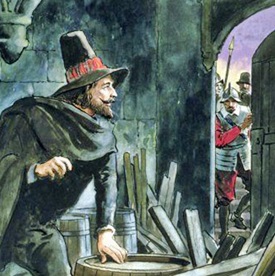
1605 – The conspiracy by English Catholics to kill King James I and replace him with his Catholic daughter, Princess Elizabeth, was cut short by the arrest of Guy Fawkes, who was charged with placing gunpowder under the Houses of Parliament.
The “Gunpowder Plot” involved digging a tunnel under the Palace of Westminster, filling it with gunpowder and then triggering a deadly explosion during the ceremonial opening of Parliament, which would have resulted in the death of not only James I, but also the leading Protestant nobility.
Since then, November 5 has been celebrated in Britain and its colonies with a bonfire burning either Guy Fawkes or the pope in effigy.
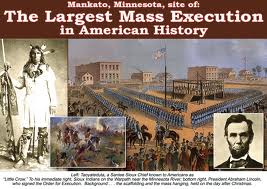
1862 – More than 300 Santee Sioux were found guilty of raping and murdering Anglo settlers and were sentenced to hang.
No attorneys or witness were allowed as a defense for the accused, and many were convicted in less than five minutes of court time with the judge.
A month later, President Abraham Lincoln commuted all but 39 of the death sentences. The men remanded by order of Lincoln were sent to a prison in Iowa, where more than half died.
One of the Indians sentenced to hang was granted a last-minute reprieve, but the other 38 were hanged simultaneously on December 26 in Mankato, Minnesota – the largest single mass execution in U.S. history.
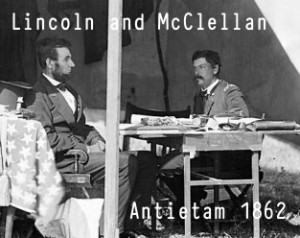
1862 – President Abraham Lincoln removed General George B. McClellan from command of the Army of the Potomac – for the second and final time.
McClellan ably built the army in the early stages of the war but was a sluggish and paranoid field commander. The final straw for Lincoln came when McClellan failed to pursue the retreating troops of General Robert E. Lee aggressively after the Battle of Antietam.
The dismissed general subsequently ran for president against Lincoln in the 1864 election and was soundly defeated.
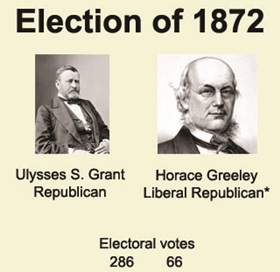
1872 – Ulysses S. Grant easily won re-election as president, defeating newspaper publisher Horace Greeley by a large margin in the popular vote and an overwhelming margin in the electoral count.
Greeley carried six states and would have received 66 electoral votes but for the fact that he died before the electoral votes were cast. As a result, his votes were divided among four other men.
The election was also the first to have a female presidential candidate: Victoria Woodhull, representing the Equal Rights Party. Her running mate was Frederick Douglass.

1872 – Suffragist Susan B. Anthony was arrested in Rochester, NY for attempting to vote in a presidential election.
She said the Fourteenth Amendment gave her that right, proclaiming, “We no longer petition legislature or Congress to give us the right to vote, but appeal to women everywhere to exercise their too long neglected citizen’s right.”
On the third day of her trial in 1873, Justice Ward Hunt asked Anthony whether she had anything to say. She responded with the most famous speech in the history of the agitation for woman suffrage movement.
Repeatedly ignoring the judge’s order to stop talking and sit down, she protested what she called “this high-handed outrage upon my citizen’s rights … you have trampled underfoot every vital principle of our government. My natural rights, my civil rights, my political rights, my judicial rights, are all alike ignored.”
She castigated Justice Hunt for denying her a trial by jury, but stated that even if he had allowed the jury to discuss the case, she still would have been denied a trial by a jury of her peers because women were not allowed to be jurors.
When Justice Hunt sentenced Anthony to pay a fine of $100, she responded, “I shall never pay a dollar of your unjust penalty,” and she never did.
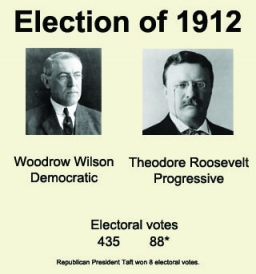
1912 – New Jersey Gov. Woodrow Wilson was elected President of the United States.
The Republican National Convention nominated incumbent President William H. Taft for re-election, but fellow Republican (and former President) Theodore Roosevelt left to form his own organization, the Progressive Party (nicknamed the “Bull Moose Party”), and declared himself a candidate for President.
Wilson won a decisive victory, capitalizing on the split Republican vote. Wilson’s 435 electoral votes were the most ever up to that time. Roosevelt finished in second, with 88 votes. Taft won only two states, totaling 8 electoral votes.
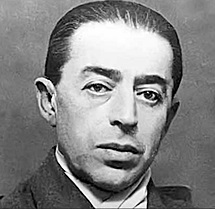
1925 – Sidney Reilly, a Russian-born secret agent employed by the Foreign Section of the British Secret Service Bureau (precursor to the modern British Secret Intelligence Service) was executed in a forest near Moscow.
In May 1918, Reilly – the so-called “Ace of Spies” – went to Moscow, intent on toppling Vladimir Lenin’s Bolshevik regime, but his plans were betrayed, and he had to flee. He returned in September 1925, but was arrested
On this date, Reilly was driven to the Sokoliniki district for exercise, which was one of his special privileges. But the car stopped, ostensibly so the driver could fix a mechanical problem.
Reilly was allowed to get out and stretch his legs. He made it about thirty paces from the car before he was shot – the order to kill Reilly came directly from Joseph Stalin.
007 Factoid: Author Ian Fleming used Reilly as a model for James Bond in his novels. Like Fleming’s fictional creation, Reilly was multilingual, fascinated by the Far East, fond of fine living, and a compulsive gambler.
Fleming refused to put his fictional character in the same league as Reilly.
“James Bond is just a piece of nonsense I dreamed up. He’s not a Sidney Reilly, you know. Nobody was.”

1935 – Parker Brothers began marketing the board game Monopoly.
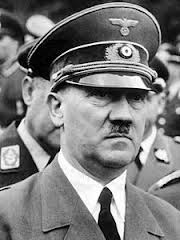
1937 – The Hossbach Memorandum: Adolf Hitler held a secret conference in the Reich Chancellery during which he revealed his plans for the acquisition of “living space” for the German people at the expense of other nations in Europe.
“The history of all ages – the Roman Empire and the British Empire – had proved that expansion could only be carried out by breaking down resistance and taking risks. There had never been spaces without a master.”
Hitler said military action was to be taken by 1943-1945 at the latest, to guard against military obsolescence, the aging of the Nazi movement, and “it was while the rest of the world was still preparing its defenses that we were obliged to take the offensive.”
Following the war, the Hossbach Memorandum was used in the Nuremberg war crimes trials as evidence of conspiracy to wage war, specifically targeting Chief of the Luftwaffe Hermann Goring, one of the attendees at the conference.
The memorandum also served to expose the ruthless cynicism of Hitler who repeatedly proclaimed a desire for peace in public, all the while laying out plans for war in Europe.
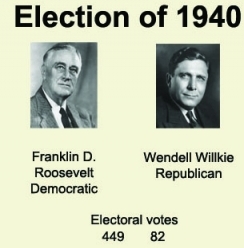
1940 – Breaking with the tradition set by George Washington, President Franklin Delano Roosevelt opted to run for a third term and easily defeated Republican Wendell Willkie.
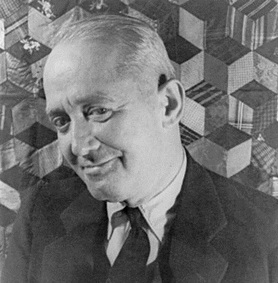
1942 – George M. Cohan died of cancer at the age of 64.
Cohan published more than 300 songs during his lifetime, including the standards ‘Over There’, ‘Give My Regards To Broadway’, ‘Yankee Doodle Dandy’ and ‘You’re A Grand Old Flag’, in addition to writing and producing over 50 Broadway plays.
Birthday Factoid: Cohan may have sang he was “born on the 4th of July” in Yankee Doodle Dandy but the only written record of his birth is a baptismal certificate which verifies that he was born in Providence, Rhode Island on July 3rd, 1878.
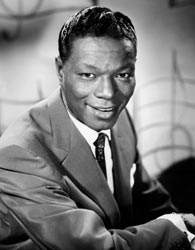
1956 – The Nat King Cole Show debuted on NBC. The variety program was the first of its kind hosted by an African-American, which created controversy at the time.
The program was ultimately done in by lack of a national sponsorship, and ended in December 1957 after Cole, not the network, pulled the plug.
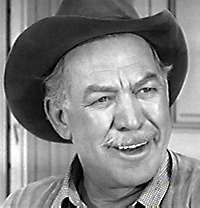
1960 – Actor Ward Bond died of a heart attack at the age of 57.
He appeared in over 200 films, including It’s A Wonderful Life, Gone With The Wind, The Searchers, Sergeant York, Rio Bravo, but is also remembered for his role of wagon master Major Seth Adams on the Wagon Train television series.
John Wayne delivered the eulogy at Bond’s funeral.
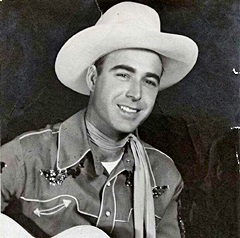
1960 – Country music singer/songwriter Johnny Horton died in a car crash in Milano, Texas. He was 35.
Among his best known songs were The Battle of New Orleans, Sink The Bismarck, North to Alaska, and Honky-Tonk Man.
In the months prior to his death, Horton started telling friends and family that he would soon die at the hands of a drunk. Before his performance at The Skyline Club in Austin, Texas, Horton stayed in his dressing room, convinced that a drunk would kill him if he hung around the bar.
After the show, Horton and two others headed for Shreveport. About 2am, near Milano, they were crossing a bridge when a truck came at them, hitting both sides of the bridge before smashing into Horton’s Cadillac. He was still breathing when he was pulled out of the car but died on the way to the hospital.
The nineteen year old truck driver was James Davis.
He was intoxicated.
Eerie Factoid: Horton’s widow, Billie Jean, had become a widow once before.
In 1953, her husband, Hank Williams, died while sleeping in the back of his Cadillac on his way to his next gig in Canton, Ohio. The cause of death was “insufficiency of the right ventricle of the heart.” He was 29.
Eerie Factoid #2: Johnny Horton and Hank Williams had something else in common. They both played their last shows at the Skyline Club.
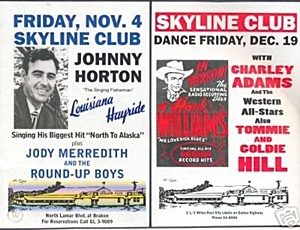
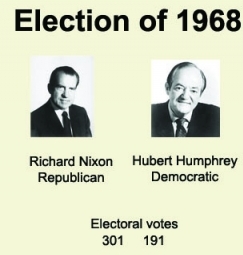
1968 – Former Vice-President Richard Nixon defeated Vice-President Hubert Humphrey to become the 37th President of the United States.
The other high-profile candidate was Alabama Gov. George Wallace, who ran on the American Independent ticket; Wallace’s major issue was opposition to racial segregation, which was a very hot topic across the country, especially in Southern states.
In the end, Humphrey wore much of the blame for the continued unrest in the country. Nixon won a close popular vote tally, besting Humphrey by less than 600,000 votes.
The electoral difference was starker, with Nixon winning 301-191. Wallace won five southern states and 46 electoral votes.

1968 – Denny McLain of the Detroit Tigers was unanimously named winner of the American League Most Valuable Player Award – and with a 31-6 record (with 28 complete games) and an ERA of 1.96 – it was no surprise.
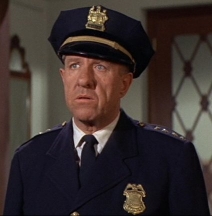
1974 – Stafford Repp died of a heart attack at the age of 56.
He was best known for his role as Police Chief O’Hara in the Batman television series.
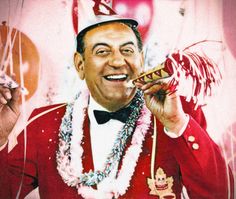
1977 – Guy Lombardo (orchestra leader best known for almost a half-century of New Year’s Eve broadcasts across America) died of a heart attack at the age of 75.
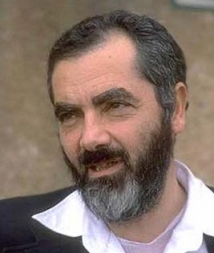
1990 – Meir Kahane, an American-born rabbi and founder of the far-right Kach movement, was shot dead in New York City.
Egyptian El Sayyid Nosair was later charged with the murder but acquitted in a state trial. The federal government later decided that the killing was part of a larger terrorist conspiracy and thus claimed the right to retry Nosair.
In 1995, he was convicted of killing Kahane during the conspiracy trial of Brooklyn-based Arab militants led by Sheik Omar Abdel-Rahman. Nosair was sentenced to life imprisonment.
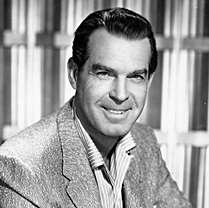
1991 – Actor Fred MacMurray died from pneumonia at the age of 83.
He appeared in more than 100 movies, including Double Indemnity, The Caine Mutiny, and The Apartment, but is best known for his role of Steve Douglas, the widowed father on the My Three Sons television series.
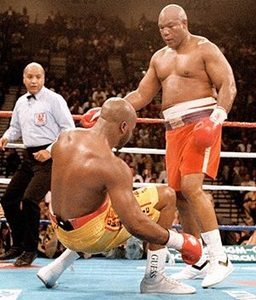
1994 – George Foreman, age 45, became boxing’s oldest heavyweight champion when he defeated 26-year-old Michael Moorer in the 10th round of their WBA fight.
More than 12,000 spectators at the MGM Grand Hotel in Las Vegas watched Foreman dethrone Moorer, who went into the fight with a 35-0 record.
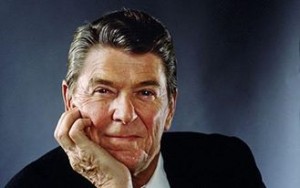
1994 – Former President Ronald Reagan disclosed he had Alzheimer’s disease.
“I have recently been told that I am one of the millions of Americans who will be afflicted with Alzheimer’s Disease … At the moment I feel just fine. I intend to live the remainder of the years God gives me on this earth doing the things I have always done … I now begin the journey that will lead me into the sunset of my life. I know that for America there will always be a bright dawn ahead. Thank you, my friends. May God always bless you.”
Reagan died of pneumonia, complicated by Alzheimer’s disease, in 2004.
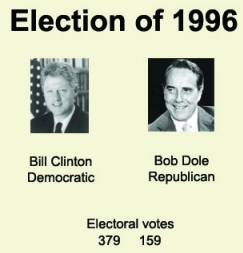
1996 – President Bill Clinton won a second term, besting Kansas Senator Robert Dole, who campaigned on a large across-the-board tax cut. Clinton campaigned on his record of prosperity and bipartisanship.
Billionaire H. Ross Perot ran as an Independent and won more than eight million votes (but no electoral votes). The popular vote difference between Clinton and Dole was just more than eight million.
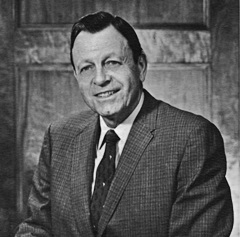
2000 – Jimmie Davis died of natural causes at the age of 101.
He was a two-term Governor of Louisiana but music fans remember him as the man who wrote You Are My Sunshine.
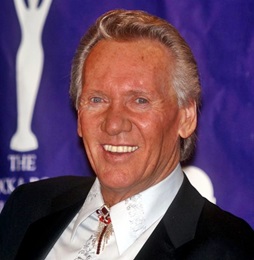
2003 – Bobby Hatfield, best known as one half of the Righteous Brothers, died at the age of 63.
He died in his sleep, hours before a scheduled Righteous Brothers concert. In January 2004, a toxicology report concluded that an overdose of cocaine had precipitated a fatal heart attack.
The initial autopsy found that Hatfield had advanced coronary disease. The medical examiner stated that “in this case, there was already a significant amount of blockage in the coronary arteries.”
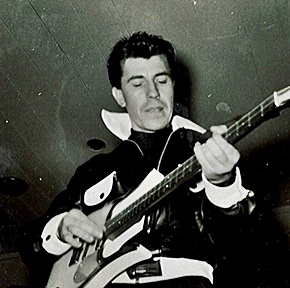
2005 – Link Wray, one of rock’s pioneer guitarists and the man credited as “the father of the power chord,” died of natural causes at the age of 76.
Idle Thought: Is there a good reason – is there any reason – why the man who gave us Rumble is not in the Rock and Roll Hall of Fame?
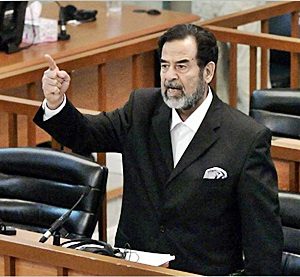
2006 – Saddam Hussein, the former president of Iraq, was found guilty of crimes against humanity and sentenced to death.
Specific charges included the murder of 148 people, the torture of women and children, and the illegal arrest of 399 members of the pro-Iranian Dawa Party (148 were executed).
The verdict and sentencing were both appealed, but subsequently affirmed by Iraq’s Supreme Court of Appeals.
Hussein died by hanging on December 30, 2006.
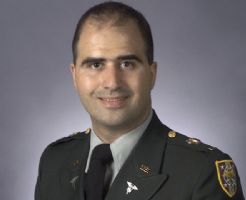
2009 – 13 people were killed and more than 30 others wounded, nearly all of them unarmed soldiers, when a U.S. Army officer went on a shooting rampage at Fort Hood in central Texas.
The deadly assault, carried out by Major Nidal Malik Hasan, an Army psychiatrist, was the worst mass murder at a U.S. military installation.
In 2013, Hasan, who was left paralyzed from the waist down as a result of shots fired at him by police attempting to stop his rampage, was tried in military court, where he acted as his own attorney.
During his opening statement, he admitted he was the shooter. Hasan had previously told a judge that in an effort to protect Muslims and Taliban leaders in Afghanistan, he had gunned down the soldiers at Fort Hood who were being deployed to that nation.
For the rest of the trial, Hasan called no witnesses, presented scant evidence and made no closing argument.
On August 23, 2013, a jury found Hasan guilty of 45 counts of premeditated murder and attempted premeditated murder, and he later was sentenced to death for his crimes.

2010 – Jill Clayburgh died from leukemia at the age of 66.
She was twice nominated for a Best Actress Academy Award; An Unmarried Woman and Starting Over.
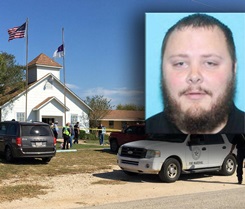
2017 – A gunman opened fire on a small church in Sutherland Springs, Texas killing 26 people – including more than a dozen children – and wounding 20 others.
The shooter, Devin Patrick Kelley, was later found dead from a self-inflicted gunshot wound.
A day after Kelley massacred parishioners at the First Baptist Church of Sutherland Springs, Texas, the U.S. Air Force admitted it had failed to enter his domestic violence court-martial into a federal database that could have blocked him from buying the rifle he used.
Under federal law, the conviction for domestic assault on his wife and toddler stepson – he had cracked the child’s skull – should have stopped Kelley from legally purchasing the military-style rifle and three other guns he had acquired in the preceding four years.
Compiled by Ray Lemire ©2019 RayLemire.com / Streamingoldies.com. All Rights Reserved.